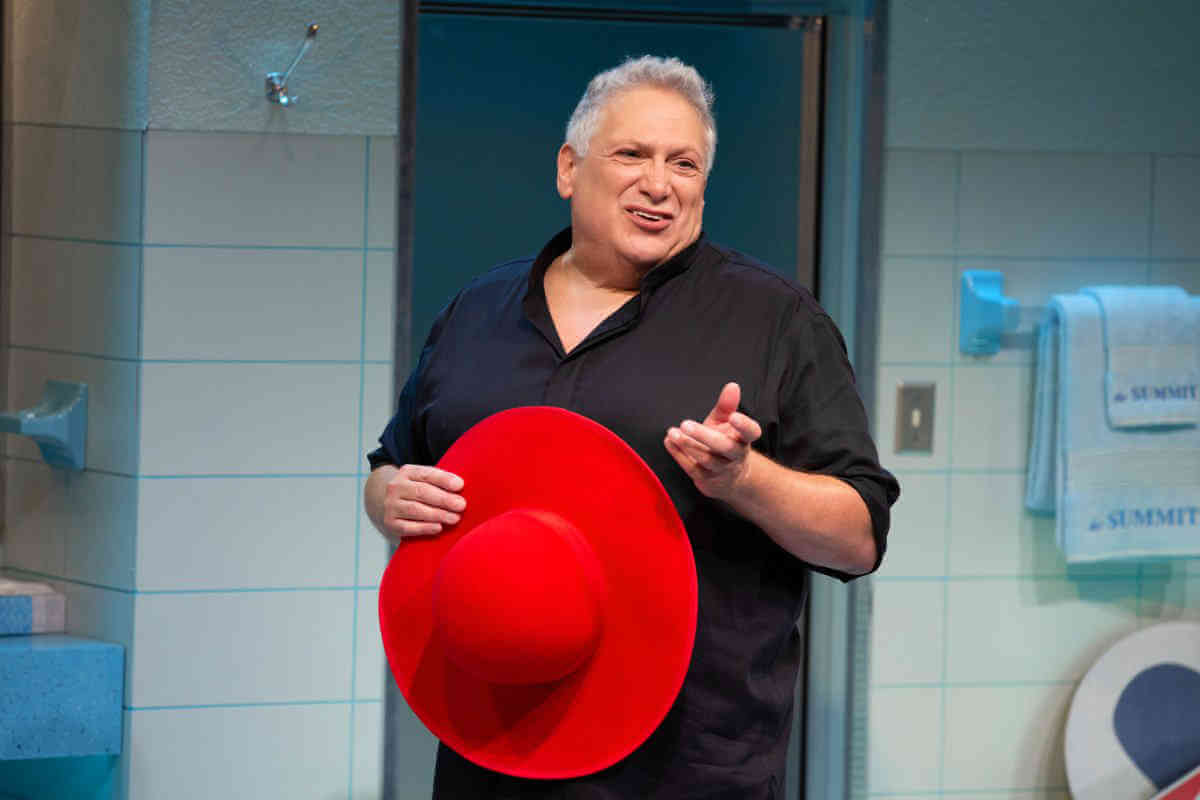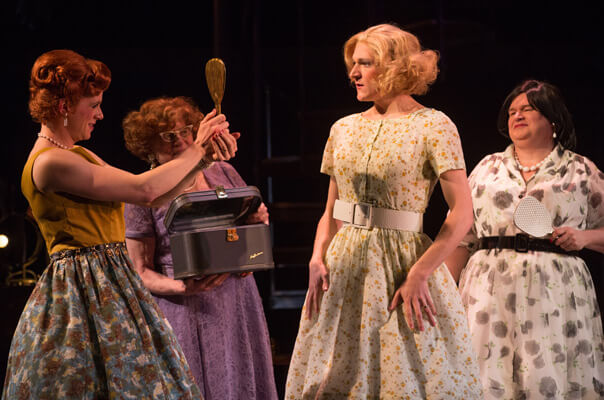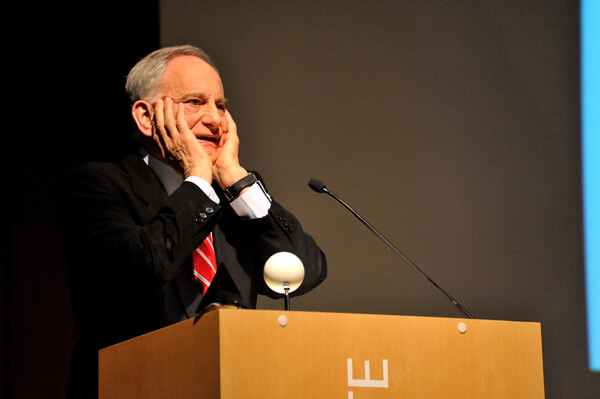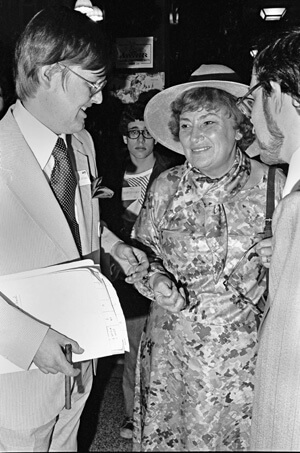Harvey Fierstein is back on stage at Manhattan Theatre Club in “Bella Bella,” a piece he wrote about the iconic Bella Abzug and in which he plays the firebrand liberal known as “Battling Bella.” Abzug made her career as an attorney, a member of Congress, and a tireless fighter for women’s rights and civil rights more broadly.
Abzug was one of the earliest supporters of LGBTQ rights, introducing in 1974 essentially what is now the Equality Act, an ardent champion of the Equal Rights Amendment, one of the strongest voices in Congress against the Vietnam War, and a proponent of Richard Nixon’s impeachment a year before he resigned. Her passion and ferocity were as much a part of her personal style as her trademark hats. Her relentless advocacy continued unabated after she concluded her six years in Congress.
In Fierstein’s 85-minute monologue, drawn from the speeches and writings of Abzug, he brings her to life with the same kind of intensity and focus that drove the woman he embodies. Fierstein plays the role in black shirt and slacks, allowing the words and ideas to convey Abzug’s gender, particularly when expressed in relationship to practices that minimized and marginalized women and, in some cases, physically separated them from men, both in Orthodox Jewish practice and in Congress.
The play is set in 1976 in a bathroom in a suite at the Summit Hotel. (John Lee Beatty designed the period-perfect set.) Abzug is hiding out from her supporters as she awaits the results of a five-way race in a US Senate primary. Needing to get away from the tension and the glad-handing, she takes advantage of her respite to tell us the story of her career and how she got to this night. Any solo show is by its nature contrived and needs some kind of framing device, and this is a pretty good one. It creates an immediacy that drives the story.
The stories she tells include her defense of Willie McGee, a black man accused of the capital crime of raping a white woman in Mississippi and convicted in three minutes whom she represented on appeal, her runs for Congress, and her break with her Orthodox faith. Fierstein delivers these with focus and intensity, and under the direction of Kimberly Senior the piece is elegantly orchestrated to take us into the heart and mind of Abzug. Fierstein brings such authenticity to the role that one never focuses on him being a man playing a woman. Rather, one feels the presence of Abzug and all she stood for. There is delicious nuance and comedy in the performance, but it is Abzug’s commitment and self-awareness that drive the piece.
Abzug would lose that election by one percentage point to Daniel Patrick Moynihan and never serve in public office again. What she never lost was her drive, idealism, and intractable sense of right and wrong. Aside from a celebration of a truly inspiring life, Fierstein reminds us of how uncommon and important Azbug was and how much we benefit to this very day from her legacy.
Many of Tennessee Williams’ plays are stylized and abstract, even when dealing with realistic characters and plots. The plays chronicle dreams, disillusionment, and passionate souls — some lost, some searching — trying to make their ways through an overwhelming and baffling world. No phrase Williams ever wrote more explains his work than Tom’s first speech in “The Glass Menagerie,” when he says, “I give you truth in the pleasant disguise of illusion.”
“The Rose Tattoo,” Williams’ 1951 play of love lost and regained in an Italian-American community on the Mississippi coast, is one of his few comedies, but it shares the barely contained emotions and turbulence of his better-known, more often-produced works. While Blanche DuBois in “A Streetcar Named Desire” removes herself from life and descends into madness, Serafina Delle Rose in “The Rose Tattoo” returns from a self-created hell to her life, but it is passion that drives both characters. Serafina ultimately releases her illusions, just as Blanche is destroyed by them.
Director Trip Cullman’s poetic, warm-hearted, and occasionally hot-blooded production of “The Rose Tattoo” now at Roundabout embraces the play’s sprawling style, filling the world of the play while staying focused on the story of Serafina who, having lost her husband early in a truck accident, has retreated into persistent mourning and celibacy. When the sexy and goofy Alvaro Mangiacavallo drops into her life, she finds that love, if not necessarily lovelier is at least possible a second time around. Alvaro is not her first husband, a paragon Serafina has held onto for years, but he is alive and present and loving. Alvaro’s clumsy but well-meaning wooing, such as getting a rose tattoo to impress Serafina, ultimately wins her over.
There are other plot points, such as Serafina’s wrestling with her faith, learning that her husband was unfaithful, and her conflict with a daughter who is in the first throes of her own passion, all of which broaden the world of the play and amplify the central theme of loss and redemption.
Marisa Tomei is spellbinding as Serafina. She fills the full range of the character with passion and excitement. This is not naturalism, and her larger-than-life portrayal has a center of fire that is operatic and compelling. Emun Elliott as Alvaro plays the role with an inherent sweetness that is intended to be a counterpoint to Serafina’s memory of her husband, and it is that charm and a healthy dose of sexual energy that open Serafina’s heart.
The supporting cast is excellent, notably Ella Rubin as Rosa, Serafina’s daughter who is just awakening to her own passion, Greg Hildreth as a lecherous traveling salesman, and Tina Benko as Estelle Hoehengarten, the unapologetic woman with whom Serafina’s husband had an affair.
It’s a sad fact of Broadway economics that an 18-member cast is a rarity, but each of these characters and the fine actors who fill them are what make the world of this play so vibrant. Though this has often been called a difficult play and atypical Williams, in the hands of Cullman and Roundabout it’s full of life. And these days, a happy, hopeful ending is welcome indeed.
BELLA BELLA | Manhattan Theatre Club at City Center Stage 1, 131 W. 55th St. | Through Dec. 1: Tue.-Wed. at 7 p.m.; Thu.-Sat. at 8 p.m.; Wed., Sat.-Sun. at 2 p.m.; some schedule variations | $99-$139 at nycitycenter.org or 212-581-1212 | One hr., 25 mins., no intermission
THE ROSE TATTOO | Roundabout at the American Airlines Theatre, 227 W. 42nd St. | Through Dec. 8: Tue.-Sat., evening schedule varies; Wed., Sat. at 2 p.m.; Sun. at 3 p.m. | $59-$299 at roundabouttheatre.org or 212-719-1300 | Two hrs., 30 mins., with intermission






































